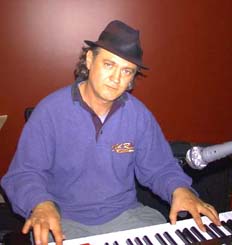






|
Paul Kunigis & Jeszcze Raz |
|
Crossing Boundaries of Language, Culture, and Style
|
|
 |
|
|
|
|
|
|
|
|
Elsewhere on the Web
|
• Jeszcze Raz (official site from Les Disques Audiogram)
|
|
|
| |
|
 Inside World Music: On the album,
you wrote songs in four different languages. When you sit down to write songs,
is the language that you choose a conscious decision - like, do you sit down
and say, "I'm going to write a song in Hebrew," or does it just sort of flow naturally?
Inside World Music: On the album,
you wrote songs in four different languages. When you sit down to write songs,
is the language that you choose a conscious decision - like, do you sit down
and say, "I'm going to write a song in Hebrew," or does it just sort of flow naturally?
Paul Kunigis: It comes by itself. Somebody asked me once, how do I dream. I have
no idea what language I dream in, and I think songwriting is the same thing. There is no
intention to write in one language or another; a song comes in the mind - a melody basically -
and once the melody is clear, the language comes automatically. If it's very rhythmic,
if it's very quarter-tones or half-tones then automatically I will go into the Hebrew or
Arab mode. If it's much more minor, then automatically I end up going into the Polish
side. That's how my brain functions anyway.
Inside World Music: How do you present your songs to audiences who most likely
do not understand most of the lyrics? How do you get the messages through to them?
Paul Kunigis: Oh, we talk. I think a Jeszcze Raz show is 90 per cent music, I
would say, but ten per cent conversation. I don't necessarily go into a detailed
synopsis of the song, but I will give them a feeling, I will give them a few phrases
that are in the song, I will tell them a little story as to how the song was born,
basically. For instance, if I take "Alte Zachen;" when I present that song, I talk
to them about the time that when I was a kid, there was an old man with his horse and
his carriage that walked in our neighbourhood with a bell, and he was yelling
"Alte Zachen" because he was picking up old clothing. So I tell them that, and that
right away put s them into the frame of mind as to where the song is. But they don't
need to know word by word to get the feeling, and strangely enough at the end of the
show sometimes people come and see me and say "We didn't understand everything, but
this is what we understood - is this true?" And most of the time they're right.
Inside World Music: Just like with languages I also hear a lot of different
musical styles on the album, like Klezmer, Middle Eastern/Arabic, blues, and jazz.
How would you describe Jeszcze Raz's sound?
Paul Kunigis: All that! [laughing] I have no idea. That also wasn't
intentional. I think it's just basically my trajectory, my life - I was born
in Poland, I was raised in Israel. I was raised in a French school in an Arab city.
My father is Jewish, my mother is Catholic; I had my Bar Mitzvah, I had my First
Communion. I came to Canada; I lived in Toronto. I got embedded with 1970's,
whatever was going in Toronto or in Canada, so that would be the rock, the blues;
I also had a soft spot for western, and that's it! The French songs, well, since
I was raised in a French school, then I was influenced by the French songs also.
So, that that's basically it - that's Jeszcze Raz.
Inside World Music: You've lived in several different parts of the World - why
did you decide to settle in Montreal?
Paul Kunigis: Montreal, to me, is like a circle where the old and the new meet.
It's also a city that allows me to maintain my French influences at the same time keep
in close touch with American or English influences. That's basically it, really. The rest, it's life - you come to a city,
you meet someone, you fall in love and you stay.
Next page > Paul Kunigis & Jeszcze Raz: Part Four >













 Inside World Music: On the album,
you wrote songs in four different languages. When you sit down to write songs,
is the language that you choose a conscious decision - like, do you sit down
and say, "I'm going to write a song in Hebrew," or does it just sort of flow naturally?
Inside World Music: On the album,
you wrote songs in four different languages. When you sit down to write songs,
is the language that you choose a conscious decision - like, do you sit down
and say, "I'm going to write a song in Hebrew," or does it just sort of flow naturally?